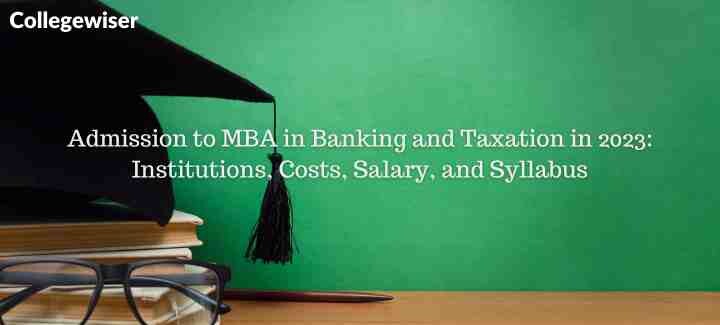MBA in Banking and Taxation Admission 2023: The MBA in Banking and Taxation is a postgraduate program that focuses on business administration and gives students the opportunity to study about the fundamentals of banking and taxation. The focus of this course is on gaining a thorough grasp of how the banking industry and taxation are related. People with this degree can work in various fields in managerial positions. The specifics of the application process for this course are mentioned below:
Enquire Now
The applicants will be qualified if they possess a bachelor’s degree in the pertinent subject of study. Candidates must hold a degree in the relevant field, preferably a BBA in banking, taxation, or accounting. 50% is thought to be the minimal score required to qualify candidates for selection. In some universities’ requirements, passing the entrance exam is also a requirement.
Options for specialization and programs are available in the MBA in Banking Taxation course. Corporate taxation, international taxation, risk management, wealth management, compliance with financial regulations, investment banking, banking operations, financial planning, and analysis are a few study areas.
Admissions for an MBA in banking and taxes: Candidates can apply for this course by concentrating on the following steps:
Application: Admissions begin with a registration process in which applicants must submit forms that are accurately filled out with personal or academic information and attach the required recent academic transcripts.
The most competitive entrance examinations for the MBA Banking Taxation program include the CAT, MAT, XAT, CMAT, MAH CET, TANCET, and others. Anyone who passes one of these examinations is qualified for admission.
Interview: The eligible candidates will be contacted for an interview to determine their qualifications and skills based on how well they performed on the entrance exam.
Selection on the basis of merit: Since entrance exam results are not used universally, some colleges only admit students with the highest academic standing.
Typical Fees: The MBA in Banking Taxation programme costs, on average, between 40,000 and 2,000,000.
Typical Salary: The salary package is between 2.5 and 10 LPA in INR.
Admission Highlights for an MBA in Banking and Taxation
| Course Name | MBA in Banking and Taxation |
| Course Level | Post Graduate |
| Admission Process | Based on the merit list, Entrance Test, and Interviews some of the institutes and colleges |
| Eligibility | Minimum 50% marks in Bachelor’s degree in any specialization |
| Duration | 2 Years |
| Course Fee | INR 40,000 to INR 2,00,000 |
| Average Salary | 2.5 LPA to INR 10 LPA |
| Recruiters After MBA | Adobe, Google, Amazon, TCS, AJIO, and more |
| Other Specializations | Finance, Operation, Sales, Human Resources, Business Analytics, Supply Chain Management, Digital Marketing, and more |
| Job Roles | Financial Analyst. Accounts Assistant., Marketing Analyst. and more |
Admission 2023 MBA in Banking and Taxation
Admission to the MBA in Banking and Taxation program is determined by the results of several entrance exams taken by candidates. on order to manage the assets of a banking firm or other organization, the curriculum instructs the students on accounting and managerial techniques.
The banking and taxes industries are both intended to grow as a result of this path. It focuses on offering technical experts in the banking industry. Taxation and banking are two distinct concepts. Credit, debit, and financial transactions are all part of banking. Taxation is the practice of taking money from the general populace to fund public goods or services.
These MBA professionals are employed in a variety of fields, including banking, education, taxation, and other accounting-related fields. For MBA Banking and Taxation professionals, well-known recruiters include RBI, AXIS, and ICICI. These tax and banking specialists may receive annual salaries ranging from INR 2.5 to 10 lakh.
Admission to the MBA in Banking and Taxation
Admission to the MBA program in banking and taxation requires a minimum of a graduation-level degree.
This PG degree course is open to students with a BBA, BA, or similar degree in banking or taxation.
For admission to the MBA in Banking and Taxation program, candidates must have at least a 50% grade in their undergraduate degree.
Admission to the MBA in Banking and Taxation is determined by merit or entrance exam.
The entry examinations for this program are the CAT, SNAP, and MAT.
These MBA students charge between INR 40,000 and INR 2,000,000 in tuition fees on average.
Exams for MBA Admission in Banking and Taxation
IPU CET BBA
Mumbai University Common Management Entrance Test (MUCMET)
Symbiosis Entrance Test (SET)
Research Management Aptitude Test (RMAT)
MBA in Taxation and Banking Feel in India
For this course, the typical academic tuition fee ranges from 40,000 to 2,000,000.
Payroll packages in India
A professional’s income can range from INR 2.5 to 10 LPA (lakhs/year) if they have an MBA in banking and taxation.
Different Courses
Full-time: A full-time PG course, the MBA in Banking and Taxation is offered.
Part-Time/Online: This course is also provided online or through distance learning.
MBA Employment Areas in Tax and Banking
| Job Profiles | Job Areas |
| Accountant | Alternative Investments |
| Employment Tax Specialist | Capital Markets |
| External Auditors | Derivatives |
| Financial Analyst | Fixed Income Securities |
| Internal Auditors | Insurance |
| Personal Finance Consultant | Investments |
| Tax Policy Analyst | Real Estate Finance |
Best University in India for MBA Admission in Banking and Taxation
| University | State | Type Of University |
| Swami Vivekanand University Admission | MADHYA PRADESH | Private University |
| Symbiosis University of Applied Sciences Admission | MADHYA PRADESH | Private University |
| Techno Global University Admission | MADHYA PRADESH | Private University |
| The Indira Gandhi National Tribal University Admission | MADHYA PRADESH | Central University |
| Vikram University Admission | MADHYA PRADESH | State University |
Syllabus for the MBA in Banking and Taxation
| Semester I | Semester II |
| Perspectives of Management | Marketing Management |
| Accounting for Management | Financial Management |
| Business Environment | Human Resource Management |
| Managerial Communication | Research Methodology for Management |
| Managerial Economics | Operations Management |
| Organizational Behaviour | Corporate Legal Frame Work |
| Quantitative Techniques for Management | Corporate Governance & Ethics |
| Semester III | Semester IV |
| Business Policy and Strategic Management | Entrepreneurship & Small Business Management |
| Operations Research | E-Banking |
| Financial Markets and ‘services | International Banking & Forex Management |
| Retail Banking | Corporate Banking |
| Insurance Products & Management | Risk Management in Banks |
| Financing Foreign Trade | Monetary & Treasury Management |
| Public Finance | NPA Management |
| Micro Finance in India | Exchange Arithmetic |
(FAQs) for the MBA in Taxation and Banking
Can I pursue an MBA in taxation?
Ans. Yes, if you have a degree from a discipline-specific university or college. Apply for this course if you wish to pursue a career in taxation.
Is taxes a lucrative profession?
Ans. A job in taxation is an excellent choice. There are numerous employment options in taxation, including those for tax preparer, auditor, specialist, associate, accountant, and financial planner, among others.
What is the tax-deductible salary?
Ans. Fresher taxation salaries in India range from 2.5 LPA to 10 LPA.




